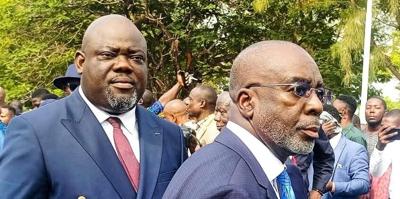The House of Representatives in Liberia grappled with a complex and contentious situation involving the refusal of former Speaker Fonati Koffa to vacate the Speaker’s office following his removal and the election of his successor, Richard Nagbe Koon. This standoff led to a heated debate within the House, raising concerns about legal processes, potential abuses of power, and the appropriate course of action to resolve the impasse.
The controversy began with Koffa’s impeachment and subsequent replacement by Koon. However, Koffa refused to relinquish the Speaker’s office, arguing that the process used to remove him was illegal and that any attempt to evict him should follow the same “illegal” procedures. He communicated his refusal through a letter to the Chief Clerk, triggering the debate within the House. Adding to the complexity, Koffa claimed to have received communication regarding the office’s status through Representative James Kolleh’s WhatsApp account, further clouding the official channels of communication and raising questions about the propriety of using such informal methods for official House business.
The House’s Committee on Rules, Order, and Administration played a key role in attempting to resolve the situation. The committee reported its efforts to facilitate a smooth transition of power, including formally requesting Koffa to vacate the office. However, these efforts were met with resistance, as Koffa not only refused to leave but also allegedly retained possession of the office keys, effectively barring access to the new Speaker. This act of defiance further escalated the tension and underscored the challenges faced by the House in enforcing its own decisions.
During the heated debate on Tuesday, February 4, 2025, various opinions emerged regarding how to proceed. Some lawmakers advocated for forceful entry into the Speaker’s office, suggesting that the House and even journalists should break in. This proposal, however, sparked concerns about the legality and potential repercussions of such an action, with other members warning against taking the law into their own hands and setting a dangerous precedent. The forceful entry suggestion highlighted the growing frustration within the House over Koffa’s refusal to comply and the perceived lack of effective mechanisms to enforce the transition of power.
In the face of these conflicting viewpoints and the potential for further escalation, the House leadership stepped in to take control of the situation. While the precise details of their intended course of action remained unclear at the time, this intervention signaled a recognition of the seriousness of the matter and the need for a considered and measured response. By assuming control, the leadership aimed to prevent further escalation of the conflict and explore options for a peaceful resolution, potentially involving legal or other official channels.
The standoff between the House of Representatives and former Speaker Koffa represents a critical juncture in Liberian politics, raising fundamental questions about the rule of law, the respect for democratic processes, and the balance of power within the legislature. The situation also underscores the potential for institutional crises when established procedures are challenged or ignored, and the importance of finding effective mechanisms for resolving disputes and ensuring a smooth transfer of power within government bodies. The House’s decision to address the issue internally, rather than resorting to immediate forceful measures, suggests a commitment to upholding legal principles and seeking a resolution that respects the integrity of the institution. The ensuing days and weeks will be crucial in determining the ultimate outcome of this power struggle and its implications for the future of Liberian governance.


